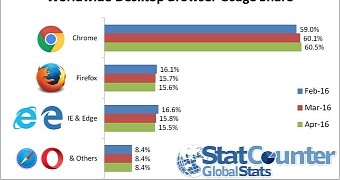Microsoft introduced Edge browser in Windows 10 with much fanfare, hoping that this way the company can become more relevant in the browser business and have a strong competitor against the likes of Google Chrome and Mozilla Firefox.
And while adoption figures show that Microsoft Edge is on the rise, Internet Explorer is collapsing, as it has already been abandoned by the Redmond-based software giant itself and is no longer receiving new features, but only security patches.
Market share data provided by StatCounter for the past three months shows that Internet Explorer and Microsoft Edge have both declined in the last few months, giving Mozilla Firefox the opportunity to take the second spot worldwide after Google Chrome.
Nobody can compete against Google Chrome
Internet Explorer and Edge dropped from 16.6 percent in February to 15.5 percent in April while Mozilla Firefox declined from 16.1 percent in the second month of the year (when it was still the third most used browser worldwide) to 15.6 percent last month, thus taking over Microsoft’s place.
As far as Google Chrome is concerned, this browser’s performance is exactly opposite. It started February with a smaller market share - 59 percent - and then improved it every single month to eventually reach 60.5 percent. This means that more than 1 in 2 PCs right now are using Google Chrome, as compared to both Firefox and Internet Explorer, which are very far behind.
Microsoft has high hopes for Edge browser, and this is one of the reasons the app is scheduled to receive a major update in the summer, when the company releases the Anniversary Update.
Microsoft going after Google Chrome
All improvements that Edge will get with this Windows 10 update are supposed to make the browser a stronger rival to Google Chrome.
Microsoft, for instance, is planning to implement support for extensions designed for Google Chrome, and they should work in the Windows 10 browser with little to no modifications. Several big developers have already announced their intention to port extensions to Edge browser, and Microsoft is optimistic that this plan could succeed.
In the meantime, however, Firefox is also losing share mostly because of the recent updates that make it more of a resource hog, not only on Windows but also on Mac OS X. Although it continues to experience a great success in the software community, Firefox has clearly lost the battle with Google Chrome, which for the moment gains more and more users every new day.

 14 DAY TRIAL //
14 DAY TRIAL //